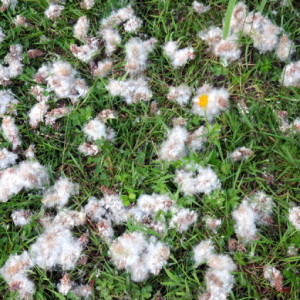Fluff
Now is the time that willows set seed Round here it's mostly goat willow, a modest tree that loves damp ditches and swampy places that have no practical purpose except for cows to cool their heels on hot days.
Noticing the ground littered with what resembled white poodle clippings. I looked up and saw all these fluffy furballs ready to burst into millions of aeronautical seeds - if seized by the wind. On a still day like today they simply drop off and become organic litter (see extra).
It's the female of the species (naturally) that bear the seeds. The male trees produce the more aesthetically-pleasing pussy willow catkins that we all know and love. By the time the bees have done their work, the male tree can rest on their 'laurels' while the female goat (nanny?) willows are left with the job of completing the cycle of generation. And their fluffy catkins are not popular everywhere. Although they have been useful to the Inuit to mix with moss for lamp wicks, they don't seem to found favour elsewhere. In China, where willows and poplars, being fast-growing trees, were planted in their millions in the second half of the 20th century to improve the look of cities and to halt rural erosion , the drifting fluff has caused so much mess and irritation (sometimes literally) that gender re-assignment is being used to control the problem. Female willows and poplars are either being injected with annual shots of male hormones, or else their upper branches are being lopped and male ones grafted on to replace them. (If you think this is far-fetched see here. )
"Each willow just needs to change branches once and the tree will never produce the stuff any more for his [sic!] entire life" claims a Beijing official of the city's arboreal transgender policy.
It's kinda ironic that willow fluff often features in classical Chinese poetry as a seasonal icon, for example Zao Bingwan from the Han Dynasty began his poem 'An Outing in Spring' thus
Beyond the mist, gossamer after gossamer
of willow fluff drifts in the wind
And a more modern poet Qing Shan promises his beloved
My heart is not like the fluff of willow catkin
Easily dispersed by the first gust of Spring breeze
Who knew there was so much to say about willow fluff when I set myself the challenge to find something to blip?
And another thing: WHY in the USA do people describe cats' fur as fuzzy when they mean fluffy? The two are quite different.


Comments
Sign in or get an account to comment.


